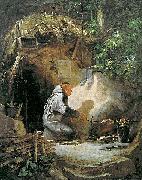Wholesale Oil Painting No Minimum |
|||||||||||
|
|
|||||||||||

|
|||||||||||
|
|
|
||||||||
Carl SpitzwegGerman Painter, 1808-1885 German painter. He trained (1825-8), at his father's insistence, as a pharmacist, by 1829 becoming manager of a pharmacy in the Straubing district of Munich. From 1830 to 1832 he made advanced studies in pharmacy, botany and chemistry at the University of Munich, passing his final examination with distinction. On receiving a large legacy in 1833, which made him financially independent, he decided to become a painter. He had drawn since the age of 15 and had frequented artistic circles since the late 1820s; but he had no professional training as a painter. He learnt much from contacts with young Munich landscape painters such as Eduard Schleich the elder and produced his first oil paintings in 1834. In 1835 he became a member of the Munich Kunstverein but left two years later due to disappointment over the reception of the first version of the Poor Poet (1837; Munich, Neue Pin.; second version 1839; Berlin, Neue N.G.), a scene of gently humorous pathos that has since become his most celebrated work. Spitzweg's decision to leave the Kunstverein, however, was also encouraged by his first successful attempts to sell his paintings independently. In 1839 he travelled to Dalmatia, where he made sketches that he used for many later works on Turkish themes (e.g. the Turkish Coffee House, c. 1860; Munich, Schack-Gal.). From the 1840s he travelled regularly, usually with his close friend, the painter Schleich, both within Bavaria and to Austria and Switzerland and also to the Adriatic coast, especially to Trieste. |
||||||||
|
|
||||||||
Eremit Huhnchen bratend
Eremit Huhnchen bratend Painting ID:: 83765 |
Date by 1885(1885)
Medium Oil on wood
cjr Date by 1885(1885) Medium Oil on wood cjr |
|||||||
|
CONTACT US |

